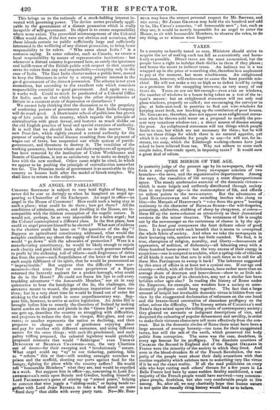THE MIRROR OF THE AGE.
Ir posterity judge of the present age by its newspapers, they will form a rare opinion of it. Every newspaper consists of two branches—the news, and the argumentative departments. Among the news, the rascalities of life occupy a most disproportionate space. The steady unobtrusive exercise of the domestic virtues— which is more largely and uniformly distributed through society than in any former age—is the commonplace of life, and affords , no salient points to the news-caterer. But the adventures of t Lord HUNTINGTOWER and the swindling leeches who clung to him—the Marquis of HERTFORD'S "voice from the grave" bearing testimony to the character of NICOLAS SUISSE—the will-forgeries, poisonings, adulteries, stabbing of sheep by clergymen, et cetera— these fill up the news-columns as attractively as their dramatized versions do the minor theatres. The rottenness of life is sought out by the newsmonger as the rottenness of cheese is by the epi- cure. Its haut gout overpowers the faint delicate odour of good lives. It is painted with such breadth that it seems to overspread the whole fabric of society. And when we take the newspapers in their lecturing vein, matters are but little mended. We find, it is true, champions of religion, morality, and liberty—denouncers of oppression, of sedition, of dishonesty—all labouring away with a three-hundred horse-power : but the very excess of their energy is suspicious—one is tempted to exclaim, what a spring-tide of villanies of all kinds it must be that sets in with such force as to call for all these Mrs. Partingtons to sweep it back! The inference suggested by this state of affairs is at least not a cynical one. If our age and country—which, with all their littlenesses, have rather more than an average share of decorum and benevolence—show to so little ad- vantage in the pages of its chroniclers, may not a similar fate have befallen other ages also ? In reading the history of Rome under the Emperors, for example, one wonders how a society so unre- deemedly profligate could hang together. The fact that a large amount of insipid but invaluable domestic virtue is hidden from our view by the exaggerated declamation of reformers on the one band and the brazen-faced ostentation of shameless profligacy on the other, solves the difficulty. The literary artists of CALIGULA'S and NERO'S days seized upon the telling points of contemporary society ; they gloated on sarcastic or indignant descriptions of vice, and deepened the colouring of popular debasement and servility, in order to make their virtuous characters tell more effectively from the con- trast. But In the domestic circles of Rome there must have been a large amount of average honesty—too tame for their exaggerated , tastes, but still the salt of the earth, which preserved. the body politic from corruption. The same was the case, doubtless, in every age famous for its profligacy. The dissolute courtiers of CHARLES the Second in England and of the Regent ORLEANS in France were the minority of the society in which they lived. And even in the blood-drunken fit of the French Revolution, the ma- jority of the people went about their daily avocations with that routine regularity which subdues men to something very like virtue if it be not the exact reality. If all the mad politicians on every side who kept cutting each others' throats for a few years in La Belle France had been by some sudden fatality annihilated, a vast majority of the French people would have survived—very common- , place people, doubtless, but also very comfortable people to live among. So, after all, we may charitably hope that human nature is not quite the rascally thing history would lead us to believe.


























 Previous page
Previous page